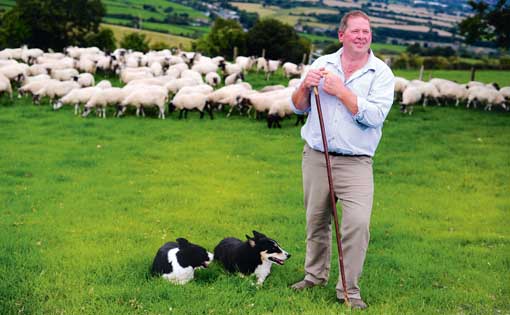FW Awards 2011: Sheep farmer of the Year finalist Kevin Harrison

Kevin Harrison
Church Farm, North Stoke, Bath
Sheep production doesn’t come much more challenging than that experienced by first-generation farmer Kevin Harrison at Bath.
The farm manager, employed for 11 years by J T Baylis at Church Farm, North Stoke, is achieving an excellent lowland flock performance on a hill farm made up of tough old Cotswold brash. Yet his projected lambing percentage of 180 per cent for this year is impressive.
Kevin’s tenacious streak ensures that he makes the most of a difficult grassland environment. The mixed farm includes 190 acres of arable and 290 acres of unimproved permanent pasture. The bottom of the farm is located on a flood plane by the River Avon and the top reaches 750 feet above the snow line.
As the only full-time employee, Kevin concentrates on the flock of 820 North Country Mules and 150 Mule ewe lambs, which are run on for replacements, while contractors handle most of the arable operation.
Suffolk rams with high estimated breeding values are used to create a Suffolk cross mule lamb. Enough rams are bought to allow for a ram to ewe ratio of 1 to 40 and all rams are given a full mot in August. The rams go in each October for lambing at the beginning of March and all the ewes are tupped within three weeks. They graze on stubble turnips and are then scanned and housed after Christmas. They are fed on straw and a high-quality nut on the floor up until lambing.
All lambing is handled indoors and Kevin is particularly proud of his lambing shed where he is recording performance figures of 214% scanned; 198% live drop and 192% turn out. Some areas are inaccessible to the tractor and even to a quad so it is tricky to finish any lambs off grass. All lambs are therefore creed fed and sold fat with the large majority of them gone by August through the Mayhill Lamb Producers Group, then Randall Parker Foods and ultimately Sainsburys or export. Carcass weights are now averaging 18.9kg and last year’s lambs averaged a price of £67.
Kevin is an innovator and keen adopter of technology. A new purchase this year has been a trailer, which has improved efficiency and relieved animal stress when vaccinating and turning out. He has also adapted a drum on a long rope to move young shearlings or flighty ewes to individual pens. EID has been applied, despite serious problems with the poor quality of EID tags and he has invested in a FecPak monitoring system for worms, which ensures wormers are used appropriately and money not wasted.
“We take flock health very seriously,” he said. ” I believe an unhealthy flock cannot perform and £2-£3 more spent on vet and med can save you a lot more in other areas.”
The farm is not yet in environmental stewardship but is taking part in the Sainsbury’s Carbon Footprint Scheme.
As is often the case with farming, there have been many obstacles outside Kevin’s control in the last 12 months. Extremely dry weather conditions limited his options on grass; he’s had snow on turnips in December for the last two years; has bought substandard sheep nuts; had mastitis in the ewes this spring and even floods by the river Avon.
“If you can find a path with no obstacles, it probably doesn’t lead anywhere,” he said. “I feel that you learn more in times of problems than when things are going well.”
The father of two makes sure that the stresses and strains do not take their toll on his family and leisure time. He is a saxophonist and song writer as well as Field Trial Secretary of the Wiltshire Working Gundog Society.
It all makes for one highly contented and rather self effacing farmer. Kevin had no farming experience before attending Bicton Agricultural College and his entire career after that has been spent teaching himself and learning by observing others.
“I am not one to boast about what I have achieved, I am just living my dream,” he said. “The dearest thing this farm has got is me, so I set out from the start to make a difference and justify me being here.”
Farm facts
Mixed hill farm of 480 acres in a lowland area
800 lambing ewes and 140 ewe lambs
Turnover £177,000 Profit £9,000
The judges liked
Good performance monitoring
Enthusiasm for new technology
Positive approach despite location difficulties
2011 Farmers Weekly Awards
